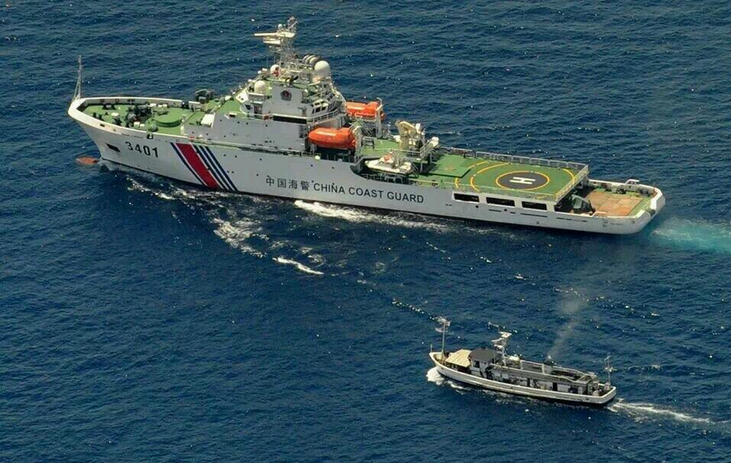Breaking
Take a stand on China reclamation works in SCS, DFA Chief tells ASEAN
MANILA — Foreign Secretary Albert del Rosario urged the Association of South East Asian Nations (ASEAN)to take a stand on China’s massive reclamation works on disputed areas in the South China Sea, warning that such activities could eventually threaten all 10 members of the regional bloc.
It was the first major call of the Philippines on the ASEAN, which is currently chaired by Malaysia, to take a definitive and stronger stand on the issue since the scale of China’s ongoing construction was revealed last year.
Four ASEAN members – Brunei, Malaysia, the Philippines and Vietnam –have been locked in long-simmering territorial rifts in the West Philippine Sea, also known as South China Sea. China and Taiwan are also involved in the disputes, which have long been feared as Asia’s next potential flashpoint for a major armed conflict.
Beijing insists ownership of nearly the whole of South China Sea, which is dotted by clusters of islands, cays, shoals and reefs with rich fishing areas. The vast sea is also believed to be abundant in oil and gas and is regarded as among the world’s most strategic and busiest waterways.
“Now is the time for ASEAN to come together,” said Del Rosario at the bloc’s ministerial meeting in Kota Kinabalu on Wednesday. “Our inaction on this would undermine the principle of centrality, since we are unable to address in a collective and unified manner such a critical issue in our own backyard.”
In his address, Del Rosario also lamented ASEAN’s failure to fully implement a non-binding accord it signed with China in 2002 to stifle tensions and plans to craft a legally binding pact to prevent the territorial conflicts from degenerating by enacting rules that would discourage aggression.
“Let us pause for a moment to assess the significance of these massive reclamation projects, all of which are appearing to be near completion as portrayed by available photos,” Del Rosario said.
China’s construction, he said, “looks like it is part of a step by step realization of China’s illegal nine-dash line” — a U-shaped encirclement that covers the breadth of Beijing’s claim in the waters.
Malaysia hosted the two-day annual ASEAN ministerial meetings as chairman of the bloc, which also includes Indonesia, Singapore, Laos, Cambodia, Myanmar and Thailand.
ASEAN has been criticized for failing to take stronger and rapid steps to ease the territorial conflicts in the South China Sea, which has been renamed West Philippine Sea by Manila.
Analysts see division among its members in their political alliances between Asian powerhouse China and the United States, which has been trying to reassert its influence in the Asia-Pacific region after several years of pre-occupation in the wars in Iraq and Afghanistan.
The Philippines and Vietnam, on the other hand, have separately increased their military engagements with Washington as they confronted China in a number of incidents in the disputed waters.
Del Rosario, who is leading the Philippine delegation in Malaysia, warned fellow ASEAN ministers that China’s reclamation is “a threat to freedom of navigation, especially when combined with other threats such as the observation network system and the Air Defense Identification Zone, which should concern all responsible nations.”
“Moreover, the profile of these developments would appear to establish full control of China over the South China Sea,” he stressed.
Del Rosario also reminded the ministers that the massive reclamation is causing “widespread destruction of the region’s marine biodiversity” and could “irreparably damage the entire ecological balance in the South China Sea.”
Manila has maintained its position that the territorial row should be resolved through international law, specifically a United Nations maritime treaty signed by the Philippines, China and 162 other governments.
The Philippines filed a case against China in 2013 before a Netherlands-based arbitral tribunal to try to declare Beijing’s enormous claim as illegal. Angered by Manila’s move, China declared several times that it will not join the proceedings as it does not recognize Manila’s case.
Keeping its silence on China’s activities, which has alarmed many foreign governments, such as the United States and Japan, “presents a strategic policy dilemma for ASEAN,” Del Rosario said.
“ASEAN should endeavor to speak with one voice in asking China to explain why it is undertaking these massive reclamation projects,” he said.
“With both freedom of navigation, peace and stability at risk, ASEAN as a regional force should consider reaching out to the community of nations to help us say to China that what it is doing is wrong, that it must immediately stop its reclamation activities,” Del Rosario said.






















